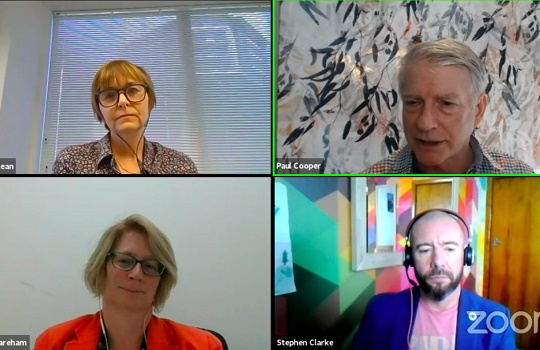
For the New Zealand Government to make meaningful and efficient use of its vast data resources, public sector leaders and workforces need to undergo a radical “change in mindset”. Data must be woven deeply into the fabric of agency processes, incorporated into decision-making at the highest level to produce high-quality insights that can be translated into tangible, trustworthy, and progressive governance.
Panellists from the FST Government New Zealand virtual conference last week, represented by senior leaders and data experts from across NZ’s public sector, recognised data as an invaluable, though insufficiently utilised, asset – one critical to improving process inefficiencies and overcoming current service limitations of governments today.
Steven Clarke, chief data officer at the New Zealand Transport Agency, recognised that, without sufficient levels of data maturity, not only will departmental decision-making and service innovations be stunted, but trust in government will deteriorate.
Low levels of data maturity, he said, require organisations to fall back on “third-party suppliers” and “black box approaches”, challenging ethical strictures around the use of data by government.
For Clarke, responsible data use and good governance are intrinsically tied. He regards public agencies as “data champions and data guardians on behalf of our public”. Should citizens perceive a failure by agencies to manage their data correctly, or an inability to meet expectations around privacy, ethics or effective use, so too will trust in government suffer.
Any perceived erosion in ‘data ethics’ also impacts levels of perceived openness and transparency of government. Further, in Clarke’s view, a lack of clear guidance around the use of data also hampers agencies’ ability to extract insights effectively.
For Clarke, the ability to deliver services behind the scenes is just as important as the “slick” front-end service platforms that customers see. He believes that efficient customer service depends on a back-end infrastructure that requires minimal “manual processing”, with data seamlessly ingested into digital systems.
Evelyn Wareham, chief data and insights officer from the Ministry of Business, Innovation and Employment, has embraced the US Federal Government Data Maturity Approach to support the Ministry’s data management and hygiene practices.
This approach, she explained, incorporates data quality, systems and technology, data governance and data management, as well as providing a baseline to assess her Department’s culture and people in response to growing data loads.
She feels it is crucial to consider the “interplay between culture and people capability, and systems and technology” if organisations are to improve the quality and use of their data.
Unifying digital with data
Panel participants were adamant that, for data to be valuable to organisations, it must, from the outset, be collected with a clear purpose in mind.
According to Wareham, the quality of data insights is determined by how and for what purpose that data was initially collected. For instance, if data has simply cumulated organically as part of workflow processes, namely “transactional data”, its value may be limited (or simply just too difficult to extract).
Curated data collected with purpose is far more meaningful to an organisation, she stressed, with insights much easier to extract.
Increasingly, agencies must consider data collection beyond a singular purpose, extended across a range of objectives. For Wareham, data collection and management should be evaluated across “multiple” use cases, both within a single “diverse agency” but also across the wider public sector.
Wareham’s own department is currently looking into master data management systems and enterprise metadata management, as well as assessing artificial intelligence (AI) tools to help identify critical gaps in data quality and data management across government.
Bridging data management process gaps will enable public agencies to collect higher-quality and more versatile datasets, increasing their value across a wider array of organisations.
Tina MacLean, general manager of data science and analytics at the Inland Revenue Department, considers not only the importance of bridging the data divide between agencies, but also the convergence of data and digital systems as vital to successful decision-making within government.
No data strategy “should stand-alone in splendid isolation”, she said. Rather, agencies should seek to harmonise and establish clear links between their data strategies.
A cohesive data strategy must, she added, be outcome-focused, “building cross-functional teams [that work] together from end-to-end across data and digital platforms”.
It is crucial that data management platforms also be backed by sufficient investment, MacLean stressed. While once regarded as the “poor cousin” of digital, data is increasingly relied upon not only to answer a variety of novel problems but increasingly for the critical functioning of core system across the public sector. In her view, agencies must adopt a more balanced outlook if they are to realise the benefits that data can afford them.
For effective convergence to occur, MacLean believes organisations need “well-articulated business strategies”. However, she acknowledged, this inter-agency alignment will require a considerable “mindset shift”.
Wareham agreed, stating that, for government to understand and respond to wider trends, like climate change or the social and governance challenges wrought by the Covid-19 pandemic, agencies need to “embrace new data sources, build trust, and work together right across the government system”.
“It’s not just about pretty dashboards. It’s about a direct connection to the need.” – Evelyn Wareham, Ministry of Business, Innovation and Employment
Wareham identified a lack of what she termed a “data culture” within agencies, wherein reports or insights on data use “don’t get the action that they were expecting” from senior management. Overcoming this inertia requires agencies to think critically about the broader questions they are trying to answer before, she says, “creating a piece of data and insights work”.
Clarke also sees this “mindset shift” as a vital change enabler.
Providing comprehensive data analytics that results in a clear course of action is only part of the puzzle; success in any data strategy requires informed and decisive decision-making from the top.
He feels agencies have work to do in “raising data literacy” across their workforces, and “particularly around the executive level”. This will ensure that ensure data is not only shifted to the top of the tech transformation agenda, but also that due investment is made in its proper collection, governance, and use.
A shared responsibility
This mindset shift extends across all aspects of data management, including that of its protection. For MacLean, the burden for securing data assets should fall not just on organisations’ data specialists – it is the responsibility of all employees.
In the past, protection of data was entrusted solely to data teams. While this perspective has no doubt evolved in recent years, participants believe there is much to do to ensure a shared, cross-agency approach to data security.
That said, change needs to be executed carefully. MacLean feels that while data protection is a foremost priority, it should not come at the cost of “stifling innovation”.
Clarke urges agencies to ensure a “high maturity level” when managing data security, much the same way as one would “think about the management of [an agency’s] financial assets”, he said.
While she believes her Department is on the right path, MacLean agrees that data as a function and responsibility of the organisation needs to be further elevated to sit alongside other high-value operations.
The New Zealand Government has established mechanisms, such as the Data Protection and Use Policy (DPUP) as well as guidelines to responsibly safeguard data. These principles, guidelines and training initiatives raise the “risk sensors of our data and digital staff”, Wareham said, supporting its responsible and ethical use.
However, there is still work to be done. Clarke suggests that government should work towards developing a comprehensive data sharing Act that clarifies how agencies can safely and efficiently exchange information – both with one another and third parties.
Currently in New Zealand there are several agreements in place governing the use and protection of data, such as data matching agreements and data sharing agreements. This, according to Clarke, creates a “muddy environment” to work within.
Cohesive legislation would ensure agencies can “transparently and easily share data”, overcoming bureaucratic hurdles while also addressing issues around data sovereignty and privacy.
Wareham agrees that legislation does help. There should, however, also be intra-agency policies that establish clear rules for data sharing within government.
Maintaining a clear purpose for the use of data can also help agencies achieve more from their data collection endeavours.
Ultimately, for Wareham, “data is just a means to an end”; the key lies in how that data is managed, understood, and used by public agencies to create trustworthy, transparent, and citizen-focused operating environment within government.





